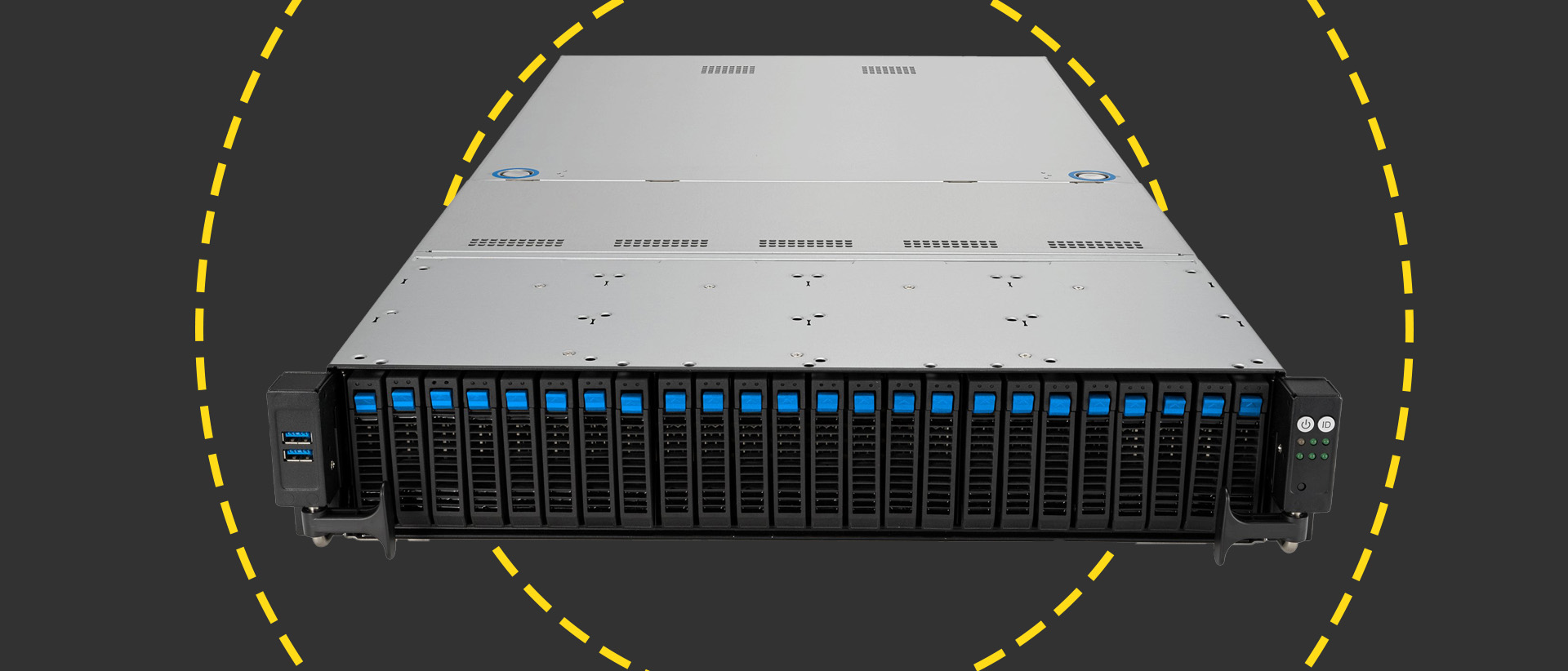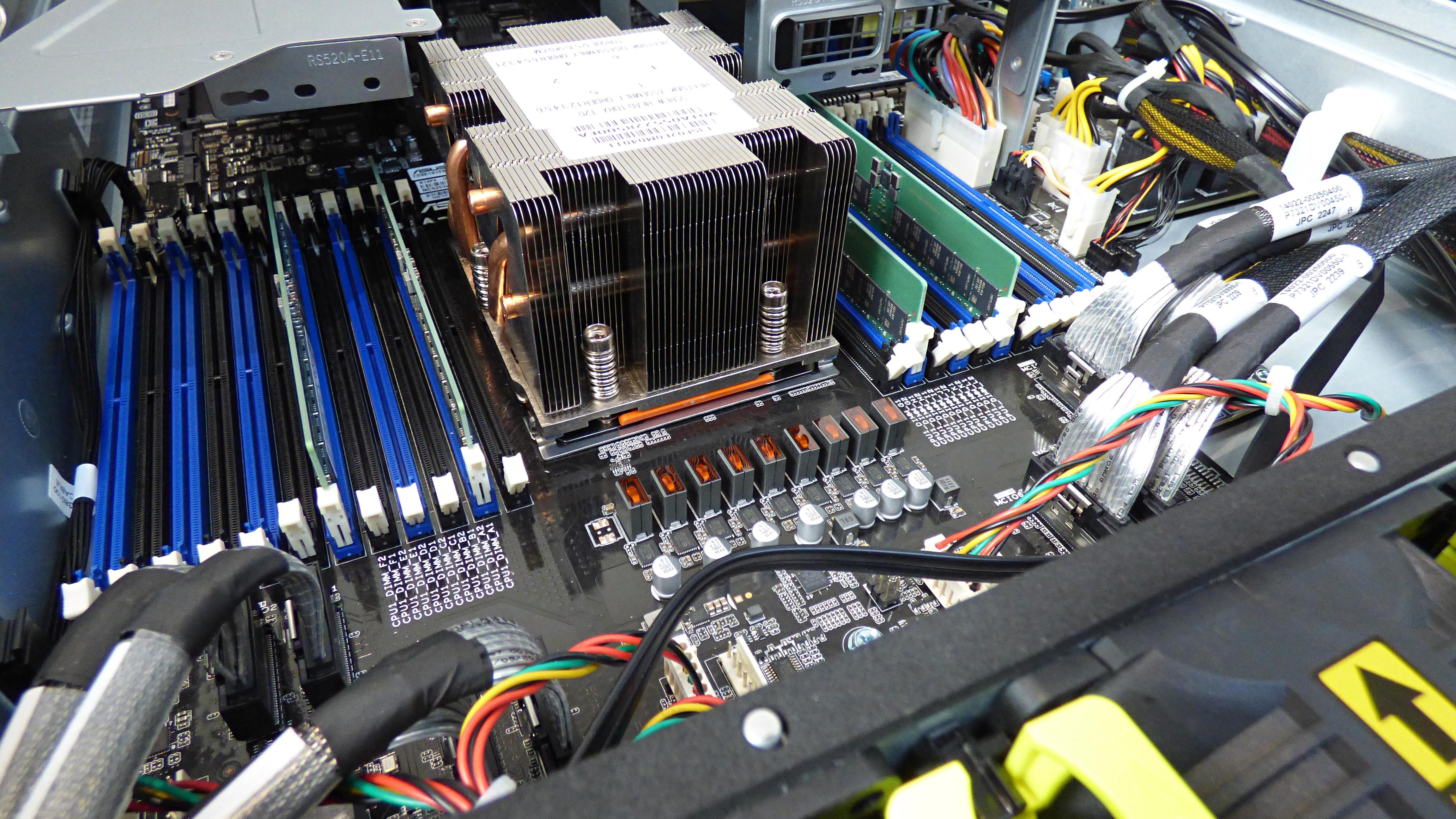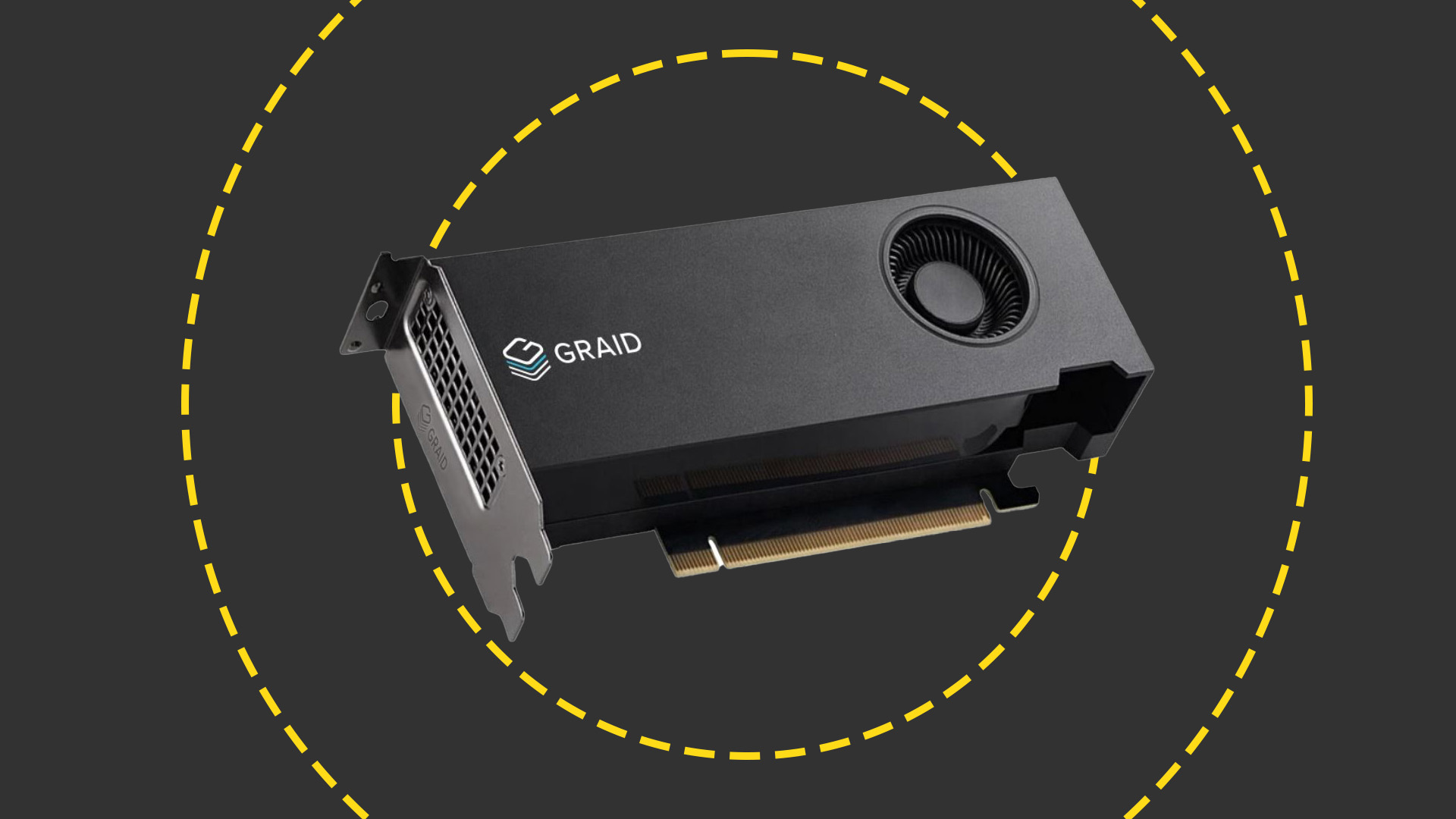Broadberry CyberServe EPYC EP1-226T review: An innovative storage server with a mind-boggling NVMe SSD performance
A great value and powerful rack server that leverages a GPU to unleash the full potential of NVMe SSD RAID arrays

-
+
+Top value
-
+
GRAID card delivers stunning speeds
-
+
AMD EPYC Gen4 power
-
+
High memory capacity
-
+
Flexible storage features
-
-
Maximum of 16 NVMe SSDs supported

At first glance, Broadberry's CyberServe EPYC EP1-226T already looks to be a well-specified and versatile server but closer inspection reveals some big surprises in the storage department. This 2U rack server supports NVMe SSDs but avoids the performance pitfalls of hardware RAID controllers by showcasing the SupremeRAID SR-1010 RAID solution from GRAID Technology.
Hardware RAID cards have a problem with the latest high-speed NVMe SSDs as their PCIe interfaces can present a performance bottleneck when handling even a small pool of these devices. Traditional software-managed RAID is a cheaper alternative but also has many limitations, not least with its voracious appetite for CPU resources.
GRAID Technology neatly overcomes these issues by handing all the hard work over to a GPU with the SupremeRAID SR-1010 based around a low-cost but powerful Nvidia RTX A2000 PCIe 4 double-width card. Essentially, it is a software-defined solution that offloads all RAID operations to the GPU and uses out-of-path technology to significantly reduce CPU load.
The SupremeRAID SR-1010 has a lot to offer as it supports up to 32 direct-attached NVMe SSDs and can manage RAID0, 1, 10, 5, and 6 arrays. It can be deployed on a wide range of Linux and Windows OSes and upcoming software updates aim to add features such as compression, encryption, and thin provisioning.
Broadberry CyberServe EPYC EP1-226T review: What's inside?

The CyberServe is built on a solid foundation which comes courtesy of Asus' latest RS520A-E12-RS24U server system. This 1P server is powered by a 2.9GHz 24-core AMD EPYC 9254 CPU and partnered by 128GB of DDR5 memory which can be pushed to a maximum of 6TB.
Cracking the lid reveals a remarkably tidy interior mainly since the SupremeRAID card doesn't require any extra cabling. The drive backplane is cabled directly to the motherboard's embedded MCIO (mini cool edge IO) ports with the SupremeRAID card sitting comfortably on its own in the left rear x16 PCIe expansion riser.
In this configuration, the server supports a maximum of 16 NVMe SSDs. The EPYC CPU presents 128 lanes with 4 taken for each SSD, 16 going to the SupremeRAID card and the rest dished out to the other PCIe Gen 5 slots, the OCP 3 Gen 5 slot, and associated devices such as the motherboard's dual M.2 NVMe/SATA SSD slots and embedded dual Gigabit LOM.
Sign up today and you will receive a free copy of our Future Focus 2025 report - the leading guidance on AI, cybersecurity and other IT challenges as per 700+ senior executives
The remaining eight drive bays can be gainfully employed by fitting standard SAS/SATA SFF devices. Your choice of OS is covered too, as Broadberry includes a rear 2-bay SFF cage fitted with 480GB Samsung PM893 SATA SSDs and managed by a Broadcom 9461-8i RAID card.
Other features of note are remote management as the server comes with an Asus ASBM11-iKVM controller chip and dedicated Gigabit port. Its web interface presents everything you need to know about server health and multiple servers can be centrally managed with the Asus Control Center web application.
Broadberry CyberServe EPYC EP1-226T review: GRAID configuration

Broadberry supplied our system with Windows Server 2022 pre-loaded on the mirrored SATA SSDs and primed with the Nvidia and SupremeRAID Windows drivers. The card comes preset to Nvidia's compute mode and Broadberry can preconfigure the NVMe SSDs to your requirements or you can do it yourself from the command prompt.
It's easy enough as you first run one command to declare the SSDs to the SupremeRAID card as physical drives (PDs), after which they are un-bonded from the OS. Now you can create a drive group (DG), specify which managed SSDs are to be included and the desired RAID array type – the card currently supports up to four DGs in Windows environments.
Lastly, you create virtual drives (VDs) which then appear as storage devices to the OS with up to eight VDs per DG supported. If required, a consistency check service can be run manually on the VDs or scheduled at regular intervals and set to automatically correct any errors.
Another advantage is the SupremeRAID card doesn't require additional cache memory and bulky battery backup units. The software needs to be licensed and Broadberry advised us the price of this system includes a perpetual license.
Broadberry CyberServe EPYC EP1-226T review: Stonking performance
Broadberry included twelve 3.8TB Micron 7450 PRO U.3 NVMe SSDs which only took a minute to declare to the SupremeRAID card. We created a RAID6 DG using them all and configured a single VD which appeared to the OS as a new 35TB drive.
For performance testing, we started with Iometer configured for 32 disk workers, a queue depth of 32, and a 1MB transfer request size. Prepare to be amazed as the VD returned a remarkable 58GB/sec and 21GB/sec for sequential reads and writes.
Moving to random operations saw no letup in speed with Iometer reporting 56.2GB/sec for reads and 20.6GB/sec for writes. Swapping Iometer over to a 4K request size delivered equally impressive I/O rates with sequential reads and writes delivering 1.11 million IOPS and 591,100 IOPS while random reads and writes both returned around 1.1 million IOPS.
RELATED WEBINAR

We also noted during testing that the SupremeRAID card was doing its job as server CPU utilization never went above 33%. Performance on our system was extremely good but it'll go even faster under Linux with GRAID Technology claiming maximum speeds for a 24 NVMe SSD RAID6 array of 260GB/sec for sequential reads and 28million IOPS for random reads.
Virtualization platform support doesn't include VMware but Broadcom's new licensing schemes are forcing many businesses to look elsewhere anyway. They'll be pleased to know that all the SupremeRAID products support Microsoft Hyper-V, Linux KVM, OpenVZ, and the increasingly popular Proxmox.
Broadberry CyberServe EPYC EP1-226T review: Is it worth it?
With the system on review costing £15,906 ex VAT, the CyberServe EPYC EP1-226T packs in a heck of a lot of hardware for your money. It works for us as a powerful general-purpose storage server but the SupremeRAID GPU card makes its credentials even more appealing.
GRAID Technology is a well-established company as it was founded in 2020 and along with the SR-1010 for 2U rack servers and SR-1000 for 1U servers, it has launched the entry-level SR-1001 which targets edge and tower servers with up to 8 NVMe SSDs. Our lab tests show the SupremeRAID SR-1010 clearly delivers on its performance promises and makes the CyberServe ideal if you want to get the best from your investment in NVMe SSD RAID arrays.
Broadberry CyberServe EPYC EP1-226T specifications
| System | 2U Asus RS520A-E12-RS24U | Row 0 - Cell 2 | Row 0 - Cell 3 |
| Motherboard | Asus K14PA-U24 | Row 1 - Cell 2 | Row 1 - Cell 3 |
| CPU | 24-core 2.9GHz AMD EPYC 9254 | Row 2 - Cell 2 | Row 2 - Cell 3 |
| Memory | 128GB 4,800MT/s DDR5 ECC (max 6TB) | Row 3 - Cell 2 | Row 3 - Cell 3 |
| Storage bays | 24 x SFF NVMe/SAS/SATA hot-swap drive bays , 2 x rear SFF hot-swap bays | Row 4 - Cell 2 | Row 4 - Cell 3 |
| Other storage | 2 x M.2 22110 NVMe/SATA SSD PCIe 4 | Row 5 - Cell 2 | Row 5 - Cell 3 |
| RAID | GRAID SupremeRAID SR-1010 PCIe 4, Broadcom 9461-8i RAID PCIe 4 | Row 6 - Cell 2 | Row 6 - Cell 3 |
| Storage included | 12 x 3.8TB Micron 7450 PRO U.3 NVMe SSDs, 2 x 480GB Samsung PM893 SATA SSDs | Row 7 - Cell 2 | Row 7 - Cell 3 |
| Network | 2 x Gigabit LOM | Row 8 - Cell 2 | Row 8 - Cell 3 |
| Expansion | Max. 5 x PCIe Gen5, 1 x OCP 3 Gen5 | Row 9 - Cell 2 | Row 9 - Cell 3 |
| Power | 2 x 1,600W 80 Plus Titanium hot-plug PSUs | Row 10 - Cell 2 | Row 10 - Cell 3 |
| Management | ASBM11-iKVM with Gigabit, Asus Control Center/Express software | Row 11 - Cell 2 | Row 11 - Cell 3 |
Dave is an IT consultant and freelance journalist specialising in hands-on reviews of computer networking products covering all market sectors from small businesses to enterprises. Founder of Binary Testing Ltd – the UK’s premier independent network testing laboratory - Dave has over 45 years of experience in the IT industry.
Dave has produced many thousands of in-depth business networking product reviews from his lab which have been reproduced globally. Writing for ITPro and its sister title, PC Pro, he covers all areas of business IT infrastructure, including servers, storage, network security, data protection, cloud, infrastructure and services.
-
 AWS just quietly increased EC2 Capacity Block prices – here's what you need to know
AWS just quietly increased EC2 Capacity Block prices – here's what you need to knowNews The AWS price increases mean booking GPU capacity in advance just got more expensive
By Emma Woollacott Published
-
 Accenture acquires Faculty, poaches CEO in bid to drive client AI adoption
Accenture acquires Faculty, poaches CEO in bid to drive client AI adoptionNews The Faculty acquisition will help Accenture streamline AI adoption processes
By Ross Kelly Published
-
 JFrog names go-to-market veteran as new CMO
JFrog names go-to-market veteran as new CMONews The experienced industry leader will lead JFrog’s global marketing activity as the firm enters its next growth phase
By Daniel Todd Published
